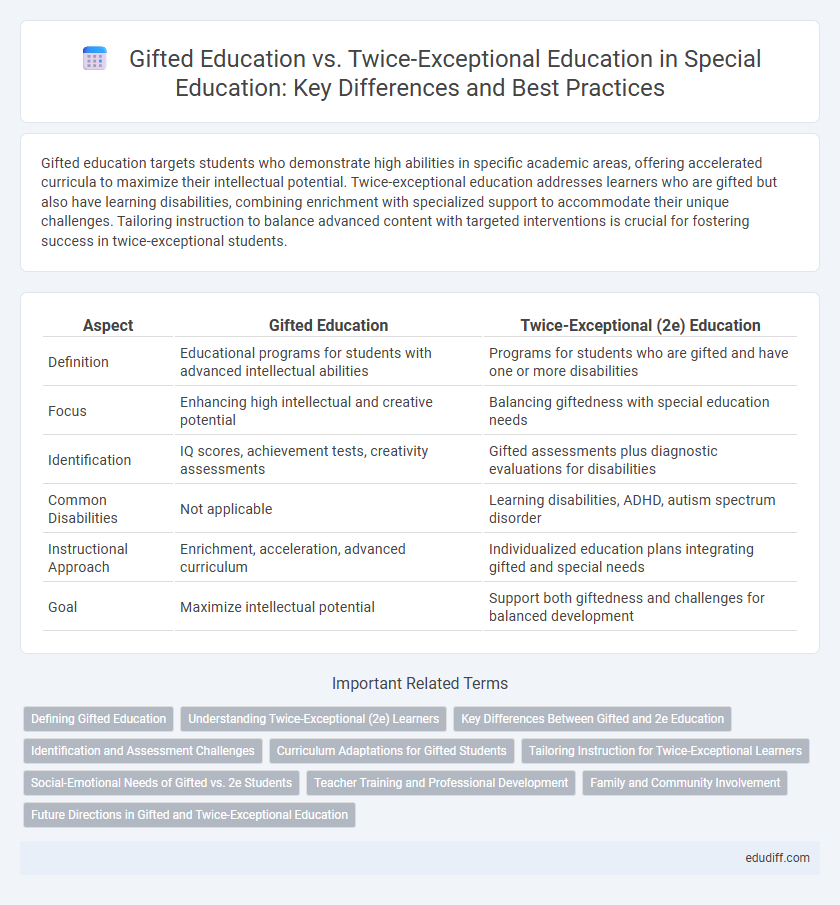Gifted education targets students who demonstrate high abilities in specific academic areas, offering accelerated curricula to maximize their intellectual potential. Twice-exceptional education addresses learners who are gifted but also have learning disabilities, combining enrichment with specialized support to accommodate their unique challenges. Tailoring instruction to balance advanced content with targeted interventions is crucial for fostering success in twice-exceptional students.
Table of Comparison
| Aspect | Gifted Education | Twice-Exceptional (2e) Education |
|---|---|---|
| Definition | Educational programs for students with advanced intellectual abilities | Programs for students who are gifted and have one or more disabilities |
| Focus | Enhancing high intellectual and creative potential | Balancing giftedness with special education needs |
| Identification | IQ scores, achievement tests, creativity assessments | Gifted assessments plus diagnostic evaluations for disabilities |
| Common Disabilities | Not applicable | Learning disabilities, ADHD, autism spectrum disorder |
| Instructional Approach | Enrichment, acceleration, advanced curriculum | Individualized education plans integrating gifted and special needs |
| Goal | Maximize intellectual potential | Support both giftedness and challenges for balanced development |
Defining Gifted Education
Gifted education targets students exhibiting exceptional intellectual abilities, creativity, or talents, providing tailored instruction to challenge and nurture their advanced skills. This specialized education emphasizes accelerated learning, enrichment programs, and differentiated curriculum to meet the unique needs of gifted learners. Unlike gifted education, twice-exceptional education addresses students who are both gifted and have diagnosed learning disabilities, requiring integrated support systems.
Understanding Twice-Exceptional (2e) Learners
Twice-exceptional (2e) learners exhibit both exceptional intellectual abilities and unique learning challenges, requiring specialized educational approaches that address their dual needs. Unlike gifted education that primarily nurtures high cognitive potential, twice-exceptional programs integrate strategies for managing disabilities such as ADHD, dyslexia, or autism spectrum disorders. Tailored interventions enhance academic growth and emotional support, optimizing learning outcomes for 2e students through multi-dimensional assessment and individualized instruction.
Key Differences Between Gifted and 2e Education
Gifted education primarily targets students with exceptional intellectual abilities or talents, emphasizing accelerated learning and advanced curriculum to enhance their strengths. Twice-exceptional (2e) education addresses learners who are both gifted and have diagnosed learning disabilities or developmental challenges, requiring a dual-focused approach that balances enrichment with specialized support. Key differences include the need for tailored interventions in 2e education to accommodate neurodiversity, while gifted education typically concentrates on cognitive advancement without the complexity of coexisting disabilities.
Identification and Assessment Challenges
Gifted education focuses on identifying students with exceptional intellectual abilities through standardized tests and teacher referrals, often emphasizing high IQ scores and academic achievement. Twice-exceptional (2e) education faces unique assessment challenges due to the coexistence of giftedness and learning disabilities, which can mask each other and lead to misidentification or under-identification. Effective evaluation for 2e students requires comprehensive, multidisciplinary assessments that consider both cognitive strengths and weaknesses to tailor appropriate educational interventions.
Curriculum Adaptations for Gifted Students
Gifted education curriculum adaptations prioritize depth, complexity, and acceleration to challenge advanced learners, incorporating enriched content and higher-order thinking tasks. Twice-exceptional education requires a differentiated approach combining gifted curriculum modifications with specialized supports addressing disabilities, such as flexible pacing and personalized learning strategies. Effective adaptations integrate scaffolding techniques that nurture both exceptional abilities and address unique learning needs to optimize academic growth.
Tailoring Instruction for Twice-Exceptional Learners
Tailoring instruction for twice-exceptional learners requires integrating advanced curriculum with specialized support to address both their giftedness and exceptionalities such as learning disabilities. Effective strategies include differentiated instruction, individualized education plans (IEPs), and multisensory teaching approaches that foster intellectual growth while accommodating unique challenges. Collaborative efforts among educators, psychologists, and families ensure that twice-exceptional students receive balanced opportunities to thrive academically and socially.
Social-Emotional Needs of Gifted vs. 2e Students
Gifted education primarily addresses the cognitive strengths and advanced learning needs of intellectually superior students, often emphasizing academic acceleration and enrichment. Twice-exceptional (2e) education, by contrast, integrates support for both high intellectual ability and coexisting disabilities, focusing significantly on the complex social-emotional challenges these students face, such as anxiety, frustration, and self-esteem issues. Research highlights that twice-exceptional students require tailored interventions that balance cognitive stimulation with emotional and behavioral support to foster holistic development.
Teacher Training and Professional Development
Teacher training in gifted education often centers on identifying high-ability students and providing accelerated learning opportunities, while twice-exceptional education requires specialized professional development to address both advanced cognitive abilities and co-occurring disabilities. Effective professional development programs incorporate strategies for differentiation, socio-emotional support, and individualized accommodations tailored to twice-exceptional learners. Investing in comprehensive training equips educators to balance the dual needs of twice-exceptional students, fostering academic growth alongside developmental support.
Family and Community Involvement
Family and community involvement plays a critical role in both gifted education and twice-exceptional (2e) education, although the approaches often differ in focus and strategy. In gifted education, collaboration with families emphasizes nurturing exceptional talents and providing enrichment opportunities, while in twice-exceptional education, the partnership centers on balancing advanced cognitive abilities with support for learning disabilities or other exceptionalities. Engaging community resources and support networks enhances personalized learning plans, promotes social-emotional development, and ensures comprehensive advocacy for both gifted and twice-exceptional students.
Future Directions in Gifted and Twice-Exceptional Education
Future directions in gifted and twice-exceptional education emphasize personalized learning plans that integrate advanced cognitive challenges with targeted support for learning disabilities. Emerging research prioritizes neurodiversity-inclusive pedagogies and technology-enhanced interventions to foster both intellectual growth and emotional well-being. Data-driven approaches using artificial intelligence and longitudinal studies aim to refine identification processes and tailor educational pathways for diverse exceptional learners.
gifted education vs twice-exceptional education Infographic

 edudiff.com
edudiff.com